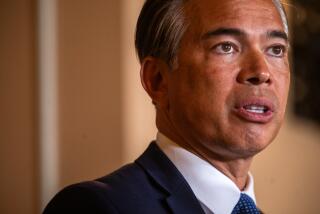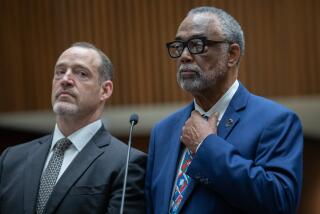Assessor corruption probe widening, indictments expected, D.A. says
Los Angeles County Dist. Atty. Steve Cooley said Tuesday that the corruption investigation of Assessor John Noguez has grown to include multiple targets and that he intends to seek grand jury indictments in the near future.
In his first public comments about the expanding criminal probe, Cooley also accused the union that represents assessor’s office employees of interfering with the investigation by ordering members to refuse to cooperate without permission from Noguez’s office.
“They’re telling potential witnesses that, until they get permission from the No. 1 target, they can’t talk,” said Cooley, waving a copy of the memo at a conference table in his office. He added that whoever issued the order will probably be the first person summoned to testify under oath in front of the grand jury.
The investigation, which began last year, has centered on tax breaks allegedly extended to Noguez campaign contributors and would-be contributors. Property tax bills are based on assessed values, which are determined by Noguez’s staff. A lower assessed value means a lower tax bill.
Although Noguez remains the only elected official targeted by the investigation, a number of “other public officials and private citizens” are also targets, Cooley said.
On April 25 investigators served search warrants at assessor’s office locations across the county, at Noguez’s Huntington Park home and at the Phoenix-area home and office of Ramin Salari, a property tax consultant and prominent fundraiser for Noguez.
Investigators also searched the offices of Andrew Stephens and Mark McNeil, two of Noguez’s top aides in the assessor’s office. Noguez and McNeil have denied any wrongdoing. Stephens could not be reached for comment.
Union officials put themselves in the crosshairs with a memo instructing members to “refuse to answer any questions, or provide any information or documents to a district attorney’s representative without a written order by the assessor’s office to comply.”
Members were also reminded that the memo was “confidential” and not for “publication, public attribution or recirculation.”
The memo explained that the union did not want prosecutors using employees’ statements against them.
“Information is the property of the employer, not the employee,” said Blaine Meek, attorney for the California Assn. of Professional Employees. Therefore, employees have to get permission before sharing information or documents with anyone, Meek said.
He could not identify the author of the unsigned document, dated March 20. “It’s an association document,” Meek said. “It has no author.”
David Demerjian, who heads the district attorney’s Public Integrity unit, said union officials were giving their members bad advice.
Instead of having a relatively quick and “casual” interview with investigators, Demerjian said, many witnesses who are not suspects will now wind up testifying “under oath, in front of the grand jury, subject to perjury charges” if they don’t tell the truth.
Asked if the assessor’s office had ever instructed employees to seek permission from the office before speaking to prosecutors, Louis Reyes, a spokesman for the office, said: “Absolutely not. We’ve publicly said we have been cooperating with the investigation.
“The only issue we’ve addressed is that if they have questions about their rights as employees, they can reach out to HR or their union, but our main thing is to cooperate with the district attorney,” he added.
Reyes also denied the assessor’s office required employees to report back on what they told prosecutors after an interview, as the memo instructs them to do.
In addition to investigating whether any public officials took direct bribes in exchange for lowered assessments, Cooley said his office is looking at potential money-laundering charges stemming from campaign contributions.
For example, he said, it is illegal for someone to exceed campaign contribution limits by giving additional donations and claiming they came from others, such as a spouse or an employee.
Salari and members of his family gave at least $10,000 to Noguez’s campaign, county records show. Salari has also admitted in court documents that he solicited campaign contributions from all of his clients.
Salari, who has built a successful business persuading the assessor’s office to lower his clients’ property assessments, has denied any wrongdoing. “Mr. Salari was a tireless and successful advocate for property owners, and he never broke the law,” said his attorney, Mark Werksman. “His relationship with John Noguez did not influence the reductions he obtained for his clients.”
Prominent L.A. real estate executive Jordan Kaplan saved an estimated $198,000 in taxes when Noguez’s staff delayed the typically routine step of updating the value of a house he bought in August 2010 for $21.5 million. The previous assessed value was $11.5 million.
Kaplan, his immediate family, co-workers and employees contributed $30,000 to Noguez’s 2010 election campaign, records show. Kaplan has also denied any wrongdoing.
Investigators acknowledged Tuesday that they were looking at transactions involving both Kaplan and Salari, among others.
Noguez reassessed Kaplan’s house for $21 million following Times articles.
Los Angeles Times staff writer Jack Leonard contributed to this report.
More to Read
Start your day right
Sign up for Essential California for news, features and recommendations from the L.A. Times and beyond in your inbox six days a week.
You may occasionally receive promotional content from the Los Angeles Times.








